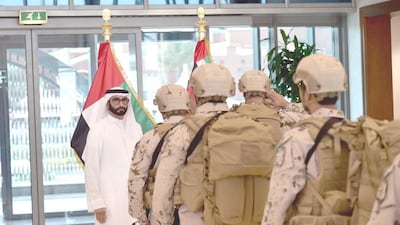US officials have been urged to make advanced military hardware available to the UAE in recognition of its moves to end the conflict in Yemen.
Danny Sebright, president of the US-UAE Business Council, told a Dubai audience of business leaders and dignitaries that the recent redeployment of UAE troops was “significant and very important”.
The development should be met by an increased willingness in Washington to “move forward on the release of more sophisticated technologies” that would bolster Emirati defences against adversaries, Mr Sebright said.
Armed drones, including the Reaper model, are among the American weapons systems that have been sought by Gulf countries, but sales have been blocked because of US rules.
Some UAE troops recently returned from Yemen after successful operations in Aden and there are continuing efforts to end the years-long conflict.
“Steps recently taken by the UAE to begin redeploying and drawing down forces in Yemen are significant and very important,” Mr Sebright said.
“These should be met by increased willingness in Washington to move forward on the release of more sophisticated technologies to sustain the UAE’s effective counter-terrorism efforts, as well as to improve their defensive posture to address a range of new and evolving threats from Iran and other aggressors in the region.”
The UN is also working to implement a deal struck in Sweden between both sides of the conflict to bring the Red Sea city of Hodeidah under its control.
Speaking at a dinner at the Dubai Airshow on Sunday, Mr Sebright warned the US stance meant that the UAE was looking elsewhere for weapons systems.
This was giving China, a strong partner of the UAE, a particular advantage in the market, he said.
“When the UAE cannot receive capabilities from the US, that they deem essential for their own legitimate self-defence needs, they say to me, 'What choice do we have but to turn to countries like China and Russia to fill those gaps?’
The US has vowed to review its policy regarding the export of some military technology, including armed drones.
It had shifted its main focus from counter-terrorism, which had dominated defence policy for the past two decades, to “great power competition”, said Ellen Lord, undersecretary of defence for acquisition and sustainment at the US department of defence.
Ms Lord told the audience that “interoperability” between branches of the US military, and allies, was crucial as the world entered a new era of cyber warfare.
“From cyber security to intellectual property, supply chain security underpinning all of this, we must ensure our industry partners are protecting their capabilities,” she said.

